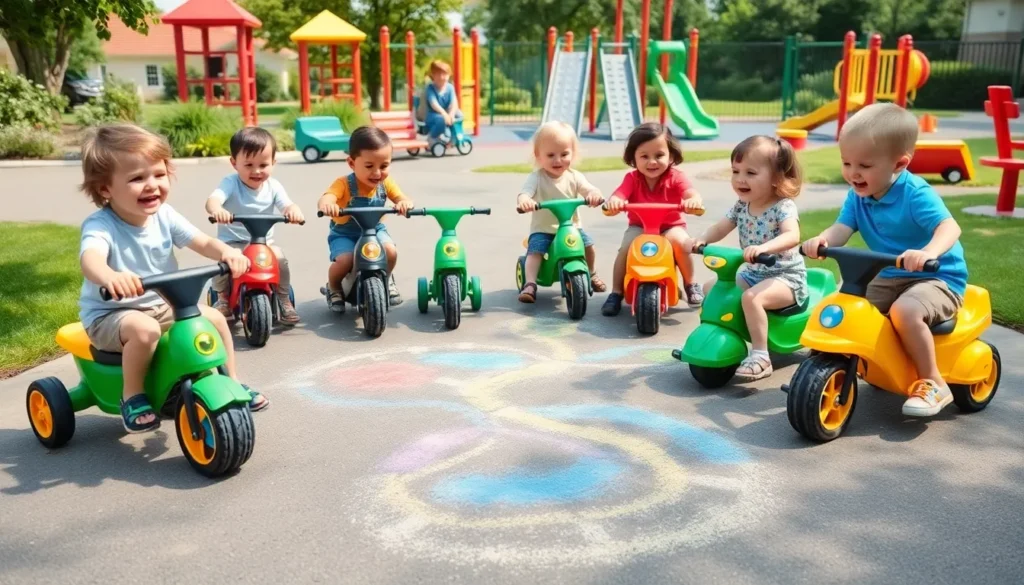Table of Contents
ToggleWhen it comes to preschoolers, transportation isn’t just about getting from point A to point B—it’s an adventure waiting to happen! Imagine little ones zooming around like race cars or floating like boats on a sea of imagination. Engaging in transportation activities not only fuels their creativity but also lays the groundwork for essential skills like coordination and problem-solving.
Importance of Transportation Activities for Preschoolers
Transportation activities play a vital role in preschoolers’ development. These experiences foster imaginative thinking and creativity. Engaging in role-play scenarios, like pretending to be pilots or bus drivers, stimulates curiosity and encourages exploration of different environments.
Children develop essential coordination skills through physical activities related to transportation. Activities like jumping, running, or balancing on lines represent various modes of travel. As preschoolers participate in these activities, they also enhance their gross motor skills and body awareness.
Problem-solving abilities improve when preschoolers navigate transportation-related challenges. Constructing toy roads, creating maps, or solving logistical puzzles encourages critical thinking. Such tasks require children to strategize and plan, foundational elements of cognitive development.
Social interaction benefits from transportation activities as well. When children work together on projects, they learn cooperation and communication. Teamwork during group games, such as relay races or “Simon Says” with transportation themes, strengthens their social skills.
Language development emerges during discussions about transportation. Engaging in conversations about different vehicles, or sharing stories about travel experiences, enhances vocabulary. Preschoolers grasp concepts like speed, direction, and distance through these dialogues.
Integration of transportation activities in daily routines offers numerous educational opportunities. Field trips to local transportation hubs or visits from community helpers, like bus drivers, broaden their understanding of the world around them.
Incorporating transportation themes into lesson plans creates interactive learning experiences. Activities involving songs, art projects, or storytelling help reinforce knowledge and concepts. Overall, the significance of transportation activities is profound in fostering holistic growth among preschoolers.
Types of Transportation Activities

Transportation activities encompass a range of engaging experiences for preschoolers. These activities can be classified into outdoor and indoor activities.
Outdoor Activities
Outdoor transportation activities allow preschoolers to explore their environment actively. Children can enjoy ride-on toys like tricycles and scooters, which enhance coordination and balance. Playing with sidewalk chalk develops fine motor skills while creating road maps or traffic signs. Group games such as “Red Light, Green Light” incorporate physical movement and teach about road safety. Nature scavenger hunts can involve finding items related to transportation, such as leaves shaped like vehicles. Experiencing a field trip to a nearby transit station introduces real-life transportation concepts and enhances observational skills.
Indoor Activities
Indoor transportation activities stimulate creativity and imagination. Creating a cardboard car or train allows preschoolers to engage in imaginative play. Setting up toy trains or cars on tracks encourages spatial awareness and fine motor skills. Sing-along songs related to vehicles can promote language development and memory retention. Craft projects involving paper plate airplanes or bus models foster artistic expression while discussing transportation themes. Storytime featuring books about vehicles can further enrich vocabulary and comprehension skills. These indoor experiences provide valuable lessons without leaving the classroom.
Educational Benefits of Transportation Activities
Transportation activities provide significant educational benefits for preschoolers. Engaging in these activities not only enhances learning but also supports development in various domains.
Motor Skill Development
Motor skills strengthen through transportation activities. Using ride-on toys like tricycles improves balance and coordination. Drawing road maps with sidewalk chalk engages gross motor skills while nurturing creativity. Playing games that involve running or hopping enhances agility and spatial awareness. These movements stimulate muscle development, encouraging physical fitness. Regular participation in such activities fosters confidence as children master new skills.
Cognitive Learning
Cognitive learning thrives with transportation activities. Exploring concepts like speed and direction expands preschoolers’ understanding of their environment. Constructing toy roads or creating maps encourages problem-solving and critical thinking. Engaging in group discussions about different vehicles fosters language development and vocabulary growth. Storytime featuring transportation-related books enhances comprehension abilities. Overall, these activities integrate fun and education, making learning both impactful and enjoyable.
Creative Transportation Activities
Engaging preschoolers in creative transportation activities stimulates their imagination and enhances learning. Pretending to be pilots encourages role-play, while children can use cardboard boxes as airplanes. Using different colored chalk, kids can create vibrant road maps on sidewalks, teaching them about navigation and spatial awareness.
Creating a mini car wash station allows for imaginative play with toy cars. Kids wash and detail their vehicles, promoting fine motor skills and cooperative play. Crafting unique vehicles from recyclable materials fosters creativity and environmental awareness.
Building roads with wooden blocks or LEGO sets introduces fundamental concepts of construction and problem-solving while reinforcing teamwork when children collaborate on projects. Setting up a scavenger hunt connected to transportation themes enhances observational skills.
Outdoor activities such as riding scooters or tricycles contribute to physical development. Children strengthen coordination and balance as they navigate around obstacles. Hosting a transportation-themed obstacle course challenges gross motor skills and incorporates fun fitness elements.
Indoor activities can include storytelling sessions where children discuss their favorite vehicles. Listening to stories about travel broadens vocabulary and comprehension skills. Singing songs related to transportation promotes rhythm while encouraging participation and language development.
Utilizing interactive games further boosts engagement. Board games centered on transportation teach counting and social interaction while developing critical thinking skills. Integrating art projects like vehicle modeling or painting helps enhance fine motor skills and self-expression.
Participating in themed group games, such as “Red Light, Green Light,” reinforces understanding of road safety rules while providing physical activity. Overall, these activities weave together fun and education, vital for preschoolers’ growth and holistic development.
Safety Considerations
Safety during transportation activities for preschoolers is critical for ensuring enjoyable and secure experiences. Educators and parents must establish clear guidelines regarding safe practices. Teachers should supervise children closely when engaging in outdoor activities like riding tricycles or scooters. Additionally, implementing rules for crossing streets or navigating around cars can significantly reduce risks.
Using safety equipment, such as helmets, is essential. Children must wear helmets while riding scooters or bikes to protect themselves in case of falls. Furthermore, teaching preschoolers about the importance of traffic signals and road signs enhances their understanding of safety measures in various environments.
Participation in organized group activities promotes awareness and cooperative learning about safety. Incorporating road safety games into transportation-themed activities helps preschoolers grasp essential concepts while having fun. Consistently reinforcing safety messages through songs and stories provides memorable learning experiences.
Emergency procedures should also be discussed with children. Familiarizing them with what to do in case of an emergency, such as finding a trusted adult or calling for help, empowers preschoolers to respond appropriately. Parents can support this learning by simulating scenarios during transportation-themed play at home.
Establishing safe play areas is crucial for injury prevention. Designated zones for riding toys or playing transportation games help minimize accidents. Moreover, ensuring that the equipment used is age-appropriate and well-maintained contributes to safety.
Incorporating conversations about personal responsibility encourages preschoolers to take care of their safety and that of others. Reinforcing the idea of looking both ways before crossing the street becomes second nature through repetition. Overall, prioritizing safety during transportation activities fosters a secure and enriching environment for young children.
Transportation activities offer preschoolers a unique blend of fun and learning. By engaging in imaginative play and hands-on experiences, children develop essential skills that lay the foundation for future growth. These activities not only enhance motor skills and cognitive abilities but also foster social interaction and language development.
Incorporating transportation themes into daily routines creates opportunities for exploration and creativity. With proper safety measures in place, these experiences can be both enjoyable and educational. Embracing transportation activities allows preschoolers to embark on exciting journeys that stimulate their minds and bodies while nurturing their overall development.







